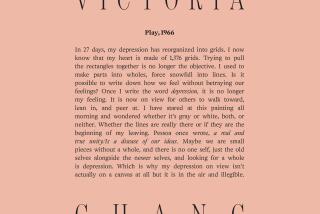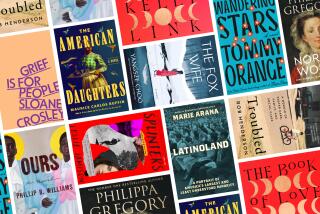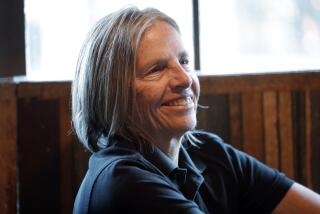Loving a Woman in Two Worlds by Robert Bly (Dial/Doubleday: $12.95; 78 pp.)
- Share via
Robert Bly’s latest book of poems is being presented as a volume of love poetry. It is, and it isn’t. The phrase “. . . in Two Worlds,” which makes up half the title is a clue that Bly is not only speaking of human relationship but also of an enigmatic, inner realm.
Bly has a history of exploring the feminine that lives within--in men as well as in women. “The peony says that we have been given a gift,/ and it is not the gift of this world./ Behind the leaves of the peony/ there is a world still darker, that feeds many.” The dark, nourishing world is the mystery that moves us--the knowledge that nature is alive. In these poems, Bly worships the mystery rather than trying, as many have, to destroy it by forcing it to make rational sense. He suggests that accepting the rhythms of nature amounts to accepting the secret rhythms of our own lives. The message-threads of meaning that run behind the poems, aren’t blatantly stated but intuited: “A power neither of us knows has spoken to us.”
There’s human love here, too, a distinct “you” to whom Bly speaks. But is she really an outer woman? Is she Bly’s interior feminine, perhaps? “The night is moist, and nourishing as your mind/ that lets everything around you live./ I saw you carry the plants inside tonight/ over the grass, to save them from the cold.” Taken literally, someone has brought plants into the house; taken figuratively, a caring figure protects and tends nature in a way that has ever-deepening spiritual resonances. With the abundance of flat, me-me-me poetry being written today, it’s wonderful to read poems that shimmer on more than one level of possibility.
Because Bly has been practicing the art of poetry for many years, the poems in “Loving a Woman in Two Worlds” are distilled, offering an informed simplicity that can be mistaken for simple-mindedness unless the reader pays attention. Bly now seems to trust that a reader can attend fully to his special voice; therefore, one wants to listen closely, to lean toward the poet and be whispered to about mysteries. “What We Provide” is a four-line piece that a reader could hear, whispered, and then want to hear again and again. “Every breath taken in by the man/ who loves, and the woman who loves,/ goes to fill the water tank/ where the spirit horses drink.” What are those horses doing there? Whose water tank? This isn’t poetry to be analyzed intellectually but to be mused on in the quiet of the reader’s questioning mind until the images gather the occult clarity that’s a product of Bly’s long journey into the psyche and into poetry.
Occasionally, there’s disappointment in the poems. Although Bly’s instinct for the right form and language carries him well most of the time, there are a few short poems that do have an oversimplified tone: A quick list of objects or animals is supposed to provide sudden revelation, but sometimes a list is only a list; the poet’s vision falters. He is also tempted by preciousness from time to time--oddly strained lines, such as, “I am faithful as the ant with his small waist,” can mar the distillation that he’s achieved in the whole of the book. Small objections, but one of the best spiritual poets we have should consider them. We don’t expect perfection, only the uninterrupted enchantment that Bly is capable of sustaining, that he does give us, often, that we deeply need.
More to Read
Sign up for our Book Club newsletter
Get the latest news, events and more from the Los Angeles Times Book Club, and help us get L.A. reading and talking.
You may occasionally receive promotional content from the Los Angeles Times.










